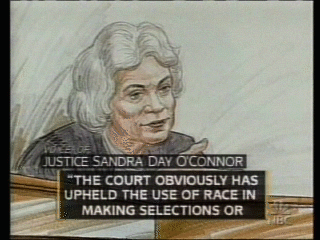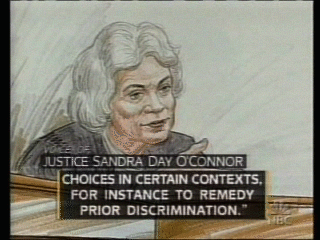Note: this case has been decided since this oral argument was heard.
Oyez Project Releases Affirmative Action Arguments in MP3 Format
It’s being released under a Creative Commons license.
There’s also a great interview with Jerry Goldman, Professor of Political Science at Northwestern on the Creative Commons site.
Category Archives: Supreme Court News
Supreme Court Upholds Affirmative Action
Supreme Court Splits on Diversity Efforts at University of Michigan
By David Stout for the NY Times.
The law school’s policy was affirmed in a 5-to-4 ruling, written by Justice Sandra Day O’Connor, that rejected Bush administration arguments that the policy should be voided. She declared that the Constitution “does not prohibit the law school’s narrowly tailored use of race in admissions decisions to further a compelling interest in obtaining the educational benefits that flow from a diverse student body.”
“Effective participation by members of all racial and ethnic groups in the civic life of our nation is essential if the dream of one nation, indivisible, is to be realized,” Justice O’Connor wrote.
She was joined by Justices John Paul Stevens, David H. Souter, Ruth Bader Ginsburg and Stephen G. Breyer.
Dissenting were Chief Justice William H. Rehnquist and Justices Antonin Scalia, Anthony M. Kennedy and Clarence Thomas.
Los Angeles Times Editorial On The Oliverio Martinez Case
Justice Takes a Beating
In The Los Angeles Times.
This is the full text of the article. It’s all too important to leave any out.
While Supreme Court Justice Clarence Thomas labored to justify the bullying interrogation of a farm worker whom an Oxnard police officer had just gravely wounded, Justice John Paul Stevens, dissenting, called the inquisition what it was: “the functional equivalent” of torture. Thomas’ 6-3 majority opinion Tuesday rolls back decades of constitutional protections against self-incrimination and all but invites the backroom rough-’em-up police tactics of old.
The farm worker, Oliverio Martinez, is blind and partly paralyzed from the five bullets that police pumped into his body after they stopped him in connection with an investigation of possible drug sales in his Oxnard neighborhood. Although Martinez initially complied with orders to dismount from his bicycle, a scuffle resulted when the officers discovered he was carrying a knife and Martinez was shot.
Paramedics arrived and carted away Martinez, bleeding and screaming, to a hospital. For nearly an hour, as Martinez waited for medical treatment and then as doctors tended him, the officers pressured him to confess to starting the fight.
“I am dying!” Martinez cried.
“OK, yes, you are dying,” the officer said. “But tell me why you are fighting with the police.”
Not once did the police officers inform Martinez of his right to remain silent and to have a lawyer present. Instead, to try to badger him into a confession, they took advantage of his physical agony and mental anguish and the fact that he couldn’t move from the hospital bed.
In the end, the officers got nothing useful from Martinez and never charged him with a crime. Martinez sued, both for the shooting and for civil damages on the ground that police violated his 5th Amendment right against self-incrimination and his due process rights against egregious police conduct. The shooting lawsuit still stands.
Writing for a splintered majority, Thomas insisted that where there was no harm of any legal consequence, there was no foul. “Martinez was never made to be a ‘witness’ against himself in violation of the 5th Amendment’s self-incrimination clause because his statements were never admitted as testimony against him in a criminal case [T]he mere use of compulsive questioning, without more, [does not] violate the Constitution.” Such a narrow thread of reasoning cuts a wide path to cruelty.
Because Martinez had not been advised of his rights, the court said, had police charged him based on his nearly incoherent statements, his disclosures would not have been admissible as evidence anyway.
Three cases before the court next term could push at the boundaries of permissible evidence in criminal cases. The Martinez case turns back the clock, and the coming cases could multiply the harm to a civilized justice system.
Supreme Court Gives Police State Its Blessing
The Supreme Court has ruled that it’s okay to beat up suspects without reading them their miranda rights in order to get statements out of them, even if those statements will most likely be thrown out later in a court of law. (Or not get thrown out, of course, considering that such decisions will be made later by individual judges on a case by case basis.)
Clarence Thomas, who wrote the opinion, said that this is true even in the extreme case of Oliverio Martinez, who was in a hospital, bleeding to death from police-inflicted bullet wounds during the interrogation in question.
Here’s a link to the opinion and concurring and dissenting opinions: CHAVEZ V. MARTINEZ.
Court Finds Coercive Questioning OK
Justices say defendants or suspects can be compelled to respond to police questioning, even though the statements may not be used against them in court
By James Gerstenzang for The Los Angeles
The Supreme Court ruled today that coercive questioning of a suspect by police officers — even a gravely wounded man who has not been offered his Miranda rights — does not violate a person’s Constitutional rights, as long as the questioning stops short of torture.
The court said defendants have the right not to have statements they make to police used in court against them during trial. But defendants or suspects can still be compelled to respond to police questioning.
The 6-to-3 decision is likely to have wide ramifications because it could open the door to increased pressure by police officers interrogating potential defendants…
Writing for the majority, Justice Clarence Thomas said that while a person under police questioning has the right not to answer questions where the answer might be self-incriminating in future criminal proceedings, “that does not alter our conclusion that a violation of the constitutional right against self-incrimination occurs only if one has been compelled to be a witness against himself in a criminal case.”
Thomas wrote: “Mere coercion does not violate the text of the self-incrimination clause absent use of the compelled statements in a criminal case against the witness.”
The farm worker, Oliverio Martinez, was questioned in a hospital emergency room after he had been shot five times by police. He had not been told of his rights to remain silent, or to have a lawyer’s assistance, and he has maintained that a police sergeant questioned him after he said he did not want the questioning to continue.
NBC News On Supreme Court Affirmative Action Case
Update June 23, 2003, the Supreme Court has handed down it’s decision on this case upholding Affirmative Action.
Here’s a clip from an NBC Nightly News with Tom Brokaw on April 1, 2003.
I’ve also collected together a bunch of links on that go with these clips here.
NBC News On Supreme Court Affirmative Action Case (Small – 6 MB)
NBC News On Supreme Court Affirmative Action Case (Hi-res 79 MB)
“At the U.S. Supreme court today, one of the most important civil rights cases in a generation…” — Tom Brokaw.






Update June 23, 2003, the Supreme Court has handed down it’s decision on this case upholding Affirmative Action.